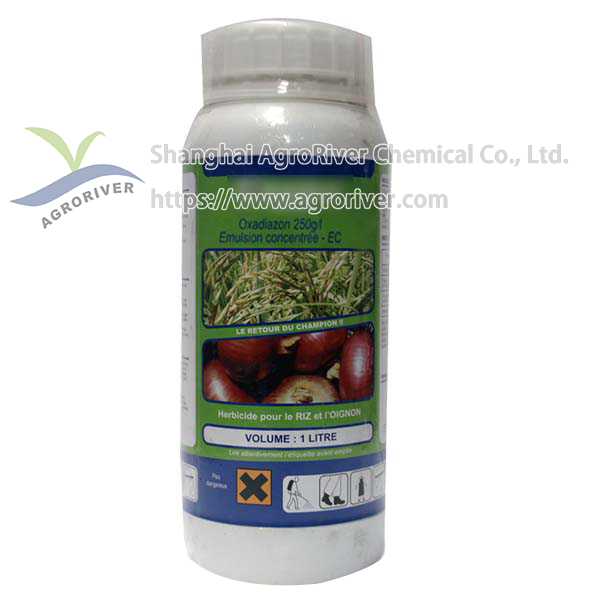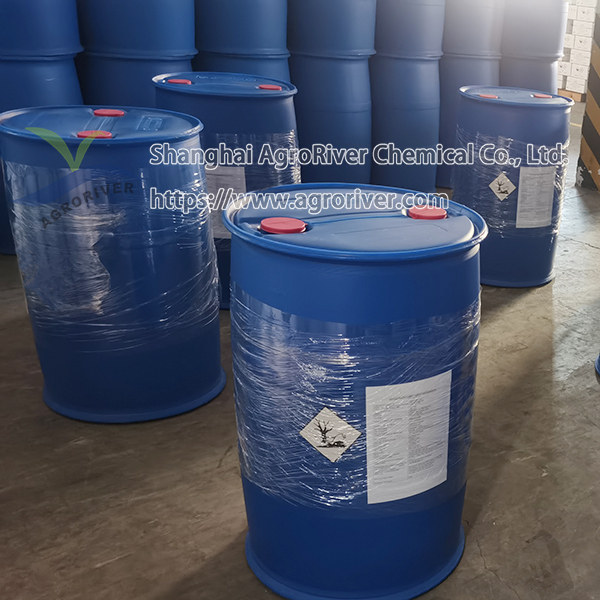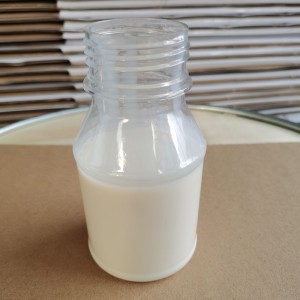Oxadiazon 400G/L EC Selective contact herbicide
Products Description
Basic Information
Common Name: oxadiazon (BSI, E-ISO, (m) F-ISO, ANSI, WSSA, JMAF)
CAS No.: 19666-30-9
Synonyms: Ronstar; 3-[2,4-dichloro-5-(1-methylethoxy)phenyl]-5-(1,1-dimethylethyl)-1,3,4-oxadiazol-2(3h)-one; 2-tert-butyl-4-(2,4-dichloro-5-isopropoxyphenyl)-1,3,4-oxadiazolin-5-one; oxydiazon; ronstar 2g; ronstar 50w; rp-17623; scotts oh i; Oxadiazon E.C.; Ronstar E.C.; 5-tertbutyl-3-(2,4-dichloro-5-isopropyloxyphenyl-1,3,4-oxadiazoline-2-ketone
Molecular Formula: C15H18Cl2N2O3
Agrochemical Type: Herbicide
Mode of Action: Oxadiazon is an inhibitor of protoporphyrinogen oxidase, an essential enzyme in plant growth. Pre-emergence effects are obtained at germination by contact with oxadiazon-treated soil particles. The development of the shoots is stopped as soon as they emerge - their tissues decay very rapidly and the plant is killed. When the soil is very dry, the pre-emergence activity is greatly reduced. Post-emergence effect is obtained by absorption through aerial parts of weeds which are rapidly killed in the presence of light. The treated tissues wither and dry out.
Formulation: Oxadiazon 38% SC, 25% EC, 12% EC, 40%EC
Specification:
|
ITEMS |
STANDARDS |
|
Product name |
Oxadiazon 400g/L EC |
|
Appearance |
Brown stable homogeneous liquid |
|
Content |
≥400g/L |
|
Water,% |
≤0.5 |
|
PH |
4.0-7.0 |
|
Water Insolubles, % |
≤0.3 |
|
Emulsion Stability |
Qualified |
Packing
200L drum, 20L drum, 10L drum, 5L drum, 1L bottle or according to client's requirement.


Application
It is used to control a variety of annual monocotyledon and dicotyledon weeds. It is mainly used for weeding paddy fields. It is also effective for peanut, cotton and sugarcane in dry fields. Prebudding and postbudding herbicides. For soil treatment, water and dry field use. It is mainly absorbed by weed buds and stems and leaves, and can play a good herbicidal activity under the condition of light. It is especially sensitive to the budding weeds. When the weeds germinate, the growth of the bud sheath is inhibited, and the tissues decay rapidly, resulting in the death of the weeds. The drug effect decreases with the growth of weeds and has little effect on grown weeds. It is used to control barnyard grass, thousand gold, paspalum, heteromorphic sedge, ducktongue grass, pennisetum, chlorella, melon fur and so on. Can also be used to control cotton, soybean, sunflower, peanut, potato, sugarcane, celery, fruit trees and other crops annual grass weeds and broadleaf weeds. It has good control effect on the weeds of Amaranth, Chenopodium, Euphorbia, oxalis and polariaceae.
If used in the planting field, the north uses 12% milk oil 30 ~ 40mL/100m2 or 25% milk oil 15 ~ 20mL/100m2, the south uses 12% milk oil 20 ~ 30mL/100m2 or 25% milk oil 10 ~ 15mL/100m2, the field water layer is 3cm, direct bottle shake or mix toxic soil to disperse, Or spray 2.3 ~ 4.5kg of water, it is appropriate to use after preparing the ground while the water is cloudy. 2 ~ 3 days before sowing, after the soil is prepared and the water is turbidity, sow the seeds when it settles to the water-free layer on the bed surface, or sow the seeds after preparation, spray treatment after soil covering, and cover with mulch film. The North uses 12% emulsion 15 ~ 25mL/100m2, and the South uses 10 ~ 20mL/100m2. In the dry seeding field, the soil surface was sprayed 5 days after rice sowing and the soil was wet before the bud, or the rice was applied after the first leaf stage. Use 25% cream 22.5 ~ 30mL/100m2







